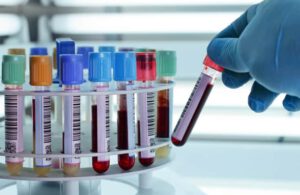
NIPT (noninvasive prenatal testing) is a prenatal screening method that replaces traditional prenatal screening techniques such as amniocentesis. NIPT is performed like any routine blood test. The test uses traces of fetal genetic material (also know as cfDNA, of cell-free DNA) that are present in the mother’s blood.
After a sample of maternal blood is drawn, fetal genetic material can be extracted from the sample and tested for chromosome abnormalities. NIPT can be performed as early as 10 weeks of pregnancy. At this stage of pregnancy, around 2-10% of genetic material in a pregnant woman’s blood originates from the fetus (fetal DNA).
What are chromosome abnormalities?
To understand the concept of NIPT, it is necessary to first understand the definition of chromosome abnormalities. Each of our body’s cells contains twenty-three pairs of chromosomes. In each pair, one chromosome is inherited from the father and one from the mother. On rare occasions, instead of passing down one chromosome, a parent may pass down two chromosomes. This condition is known as a trisomy – three chromosomes in a cell instead of two.
The most common trisomy is trisomy 21, also known as Down syndrome. The chromosomes are numbered (1-22), the last pair represent the sex chromosomes. since the extra chromosome is passed down to the fetus only during its formation, it is impossible to undergo pre-conception genetic testing for trisomies, unlike various other hereditary diseases that can be tested.
How do NIPT tests work?
Pregnant women’s circulation contains many segments of fetal DNA. This happens since cell-free DNA (cfDNA) is released into the blood stream during the creation of new cells.
In a normal pregnancy, circulation contains a constant ratio of segments from each chromosome, this ratio remains throughout the pregnancy. However, if the number of fetal chromosomes is anormal, this ratio changes. For instance, a woman pregnant with a fetus with Down syndrome (trisomy 21) will have a larger amount of fetal DNA segments related to trisomy 21 in her blood stream.
The different NIPT tests analyze and count millions of fetal DNA molecules, a procedure that was once considered to be science fiction at most.
What are the different NIPT tests?
Among popular NIPT tests:
MaterniT21: tests for extra chromosomes and sex chromosomes aneuploidies and may be customized for more disorders.
Harmony: developed by Ariosa Diagnostics, this test screens for common trisomy 21, 18 and 13.
Panorama: developed by Natera, screens for trisomoes 21, 18 ans 13, tests for triploidy.
Verifi: produced by Verinata Health, screens for trisomies 21, 18 and 13 and fetal sex chromosome aneuploidies.
NIFTY: Produced by BGI, available in a basic version that screens for trisomy 21, 18 and 13, and an extended version that screens for over 20 chromosome abnormalities.
What are the pros and cons of NIPT?
NIPT’s biggest advantage is that they are non-invasive and do not pose danger to the pregnancy, in contrast to traditional prenatal invasive tests such as amniocentesis that is associated with certain risks for complications.
The downside of NIPT is their accuracy level. Even after receiving negative results, there is still a small chance that the fetus has a genetic disorder and vice versa- if the test results show a risk for a certain chromosome abnormality, further conventional tests are still recommended (such as amniocentesis or CVS).
Another downside of these tests is cost. These tests may be pricey, and insurance may only cover costs in certain cases, such as women over 35 (other prenatal tests are covered by insurance, this varies by country).
It should be noted that NIPT’s accuracy rates for all trisomies are yet to be clear, accuracy levels are also unclear in non-risk pregnancies.

